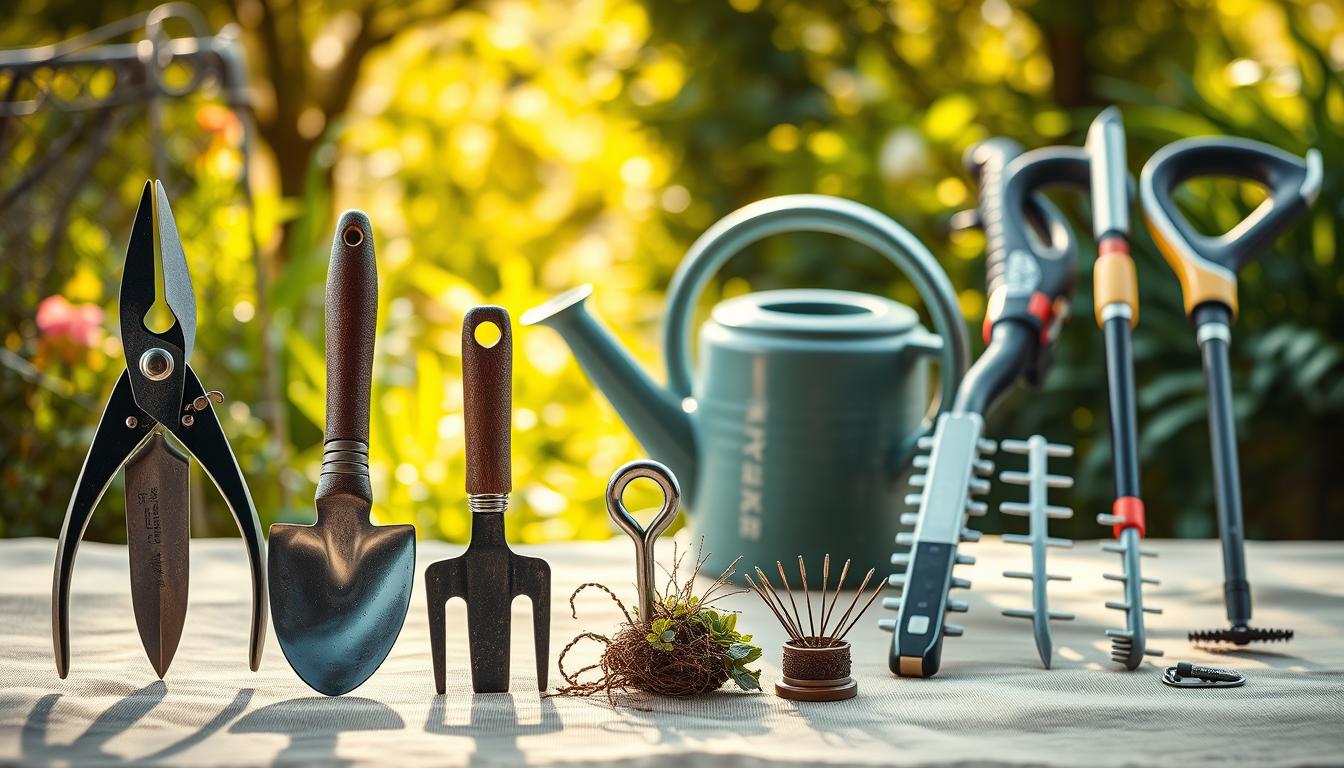Do you spend your weekends working in the yard instead of enjoying it? You’re not alone. As our lives get busier, we all want to keep our yards beautiful without spending too much time on it.
The right tools can make yard work much quicker. New lawn and garden tools are designed to work fast. They help you get professional-looking results in no time.
Whether you have a small garden or a big yard, we’ve got you covered. This guide will show you the best tools for your space. We’ll cover everything from essential basics to advanced systems that change yard care.
We’re looking for tools that are efficient, affordable, and high-quality. By the end of this article, you’ll know which tools will save you the most time. And your yard will look great all season.
Why efficiency matters in modern gardening
Today, many homeowners struggle to balance work and garden care. With longer work hours, finding time for gardening is tough. The dream of a beautiful backyard often clashes with our busy lives, leaving gardens neglected.
The Challenges of Maintaining a Backyard in Today’s Busy World
Weekends are quickly filled with family, chores, and rest. Gardening, when we can, is often tiring before we’ve done much. Many feel overwhelmed by the endless tasks of weeding, watering, and pruning.
Seasonal garden tasks add to the stress. Spring planting and fall cleanup demand a lot of time during busy periods. This leads to neglect and then frantic catch-up efforts.
How the Right Tools Can Transform Your Gardening Experience
Investing in the right tools can save a lot of time and effort. What used to take hours can now be done in minutes. These tools help you work smarter, not harder.
Using efficient tools makes gardening enjoyable, even with a busy schedule. Many gardeners find more joy in gardening with tools that reduce strain and boost productivity.
| Traditional Approach | Time Required | Modern Efficient Approach | Time Required | Time Savings |
|---|---|---|---|---|
| Manual watering with hose | 45 min daily | Automated irrigation system | 5 min weekly | 95% |
| Hand weeding | 3 hours weekly | Long-handled weed removers | 30 min weekly | 83% |
| Push mower | 90 min weekly | Robotic lawn mower | 10 min setup weekly | 89% |
| Manual hedge trimming | 2 hours monthly | Electric hedge trimmer | 20 min monthly | 83% |
Assessing your garden’s specific needs
Smart gardeners know that evaluating their outdoor space is essential before investing in tools. They take inventory of their garden’s unique characteristics. This helps them avoid buying equipment that gathers dust and ensures they have what they need for efficient maintenance.
Evaluating Your Garden Size and Layout
Start by measuring your garden’s dimensions and noting its key features. A small urban garden with raised beds needs different tools than a sprawling suburban yard with mature trees and extensive landscaping.
Consider your terrain too. Sloped areas, rocky soil, or clay-heavy ground each present unique challenges. Make note of access points, narrow passages, and any areas where standard equipment might struggle to reach.
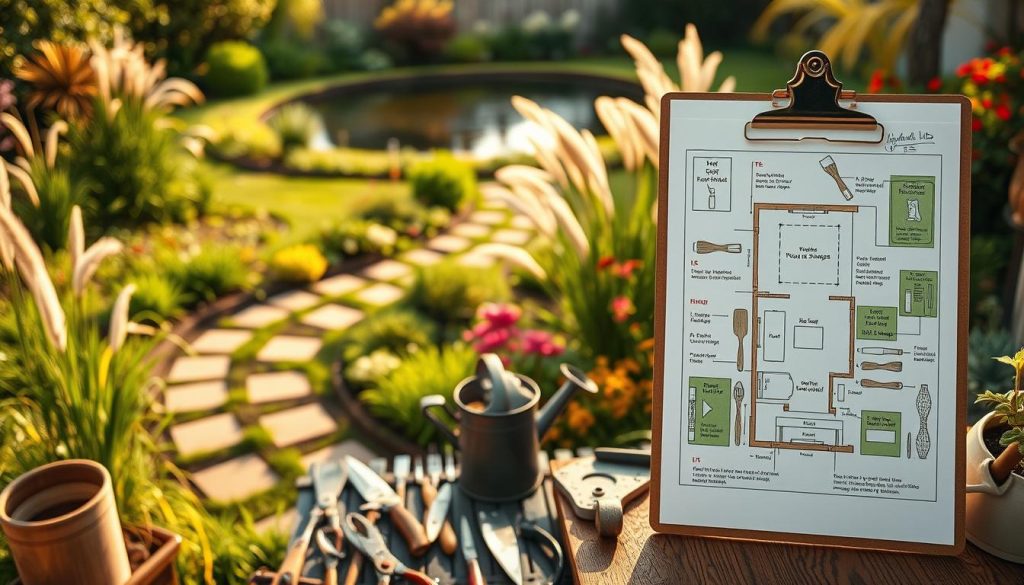
Identifying Your Most Time-Consuming Gardening Tasks
Conduct a simple time audit during your next few gardening sessions. Track which activities consume the most hours and cause the most physical strain. Ask yourself these revealing questions:
- Which garden task do you most frequently postpone?
- Where do you experience the most physical fatigue?
- What seasonal activities seem to take forever?
- Which areas of your garden receive less attention due to maintenance difficulties?
Your answers will highlight where user-friendly gardening accessories can make the biggest impact on your routine.
Matching Tools to Your Specific Gardening Challenges
Once you understand your garden’s layout and maintenance pain points, you can make targeted tool investments. Remember, the goal isn’t to own more tools—it’s to have the right ones for your situation.
| Garden Challenge | Garden Type | Recommended Time-Saving Tools | Estimated Time Savings |
|---|---|---|---|
| Frequent watering needs | Vegetable/flower beds | Drip irrigation system, timer | 3-5 hours weekly |
| Large lawn maintenance | Suburban yard | Robotic mower, zero-turn mower | 2-3 hours weekly |
| Dense shrubs/hedges | Formal garden | Extended-reach electric trimmer | 1-2 hours per session |
| Persistent weeds | All gardens | Long-handled weed puller, weed barrier | 2-4 hours weekly |
| Heavy soil work | New gardens/beds | Electric tiller, ergonomic spade | 50-70% effort reduction |
This thoughtful evaluation process ensures your time-conscious garden maintenance tools actually deliver on their promise. By matching specific solutions to your unique challenges, you’ll build an arsenal of genuinely useful equipment rather than collecting implements that don’t address your real needs.
Time-saving gardening tools every homeowner should own
Smart homeowners know that the right gardening tools save time. They help turn weekend yard work into quick sessions. This lets you enjoy your outdoor space more.
Multi-purpose Tools That Eliminate Tool-Switching
Switching tools wastes a lot of time in gardening. Multi-functional tools fix this issue. For example, a 3-in-1 weeder can dig, pull, and cut weeds with one tool.
Garden multi-tools with interchangeable heads are a big help. They have a single handle that fits different attachments. This lets you switch functions quickly.
Telescoping tools are another big improvement. They can extend to reach high branches or retract for close-up work. This makes one tool replace several others.
Quality Considerations for Long-Term Efficiency
Choosing cheap tools might seem good, but quality saves time. Tools with carbon steel blades stay sharp longer. This makes cutting easier.
Ergonomic design is key for comfort. Look for tools with cushioned, non-slip grips. They reduce hand fatigue and let you garden longer.
Handles and tool heads are common weak spots in cheap tools. Quality tools have secure connections. These won’t loosen or break during use, saving you from failures.
Budget-Friendly Options With Maximum Impact
You don’t need to spend a lot to build your gardening arsenal. Start with the tools you use most. A good hand trowel and pruner are more useful than many cheap tools.
Watch for sales and look at refurbished tools from trusted brands. Many offer refurbished tools at lower prices. These are nearly as good as new.
| Multi-Purpose Tool Type | Time-Saving Features | Ideal For | Price Range | Durability Rating |
|---|---|---|---|---|
| Garden Multi-Tool System | Interchangeable heads, quick-release mechanisms | Varied garden tasks, limited storage space | $60-120 | High |
| 3-in-1 Weeder | Combined digging, cutting, and pulling functions | Weed management, small gardens | $15-40 | Medium |
| Telescoping Pruner/Saw | Adjustable length, dual cutting functions | Tree maintenance, hard-to-reach areas | $35-80 | Medium-High |
| Combination Rake-Hoe | Dual-sided head, ergonomic handle | Soil preparation, leaf collection | $25-50 | Medium |
Building an efficient tool collection takes time. Start with versatile tools for your biggest tasks. Then add more as you can.
Advanced watering systems that do the work for you
Water-wise gardeners are turning to smart irrigation technology. It saves time and helps plants grow better. Watering is a big task, but automation can make it easier.
Today’s lawn care solutions cut down watering time. They make sure plants get the right amount of moisture.
Smart Irrigation Controllers Worth the Investment
Smart irrigation controllers are at the forefront of garden tech. They connect to your sprinkler system. They use weather, soil, and plant data to set watering schedules.
You can manage them with apps on your phone. Systems like Rachio or Orbit B-hyve can save up to 50% water. They also save 3-5 hours a week on watering.
The cost is $100-$250 at first. But, the savings and ease soon make it worth it. Even those not tech-savvy find these systems easy to use.
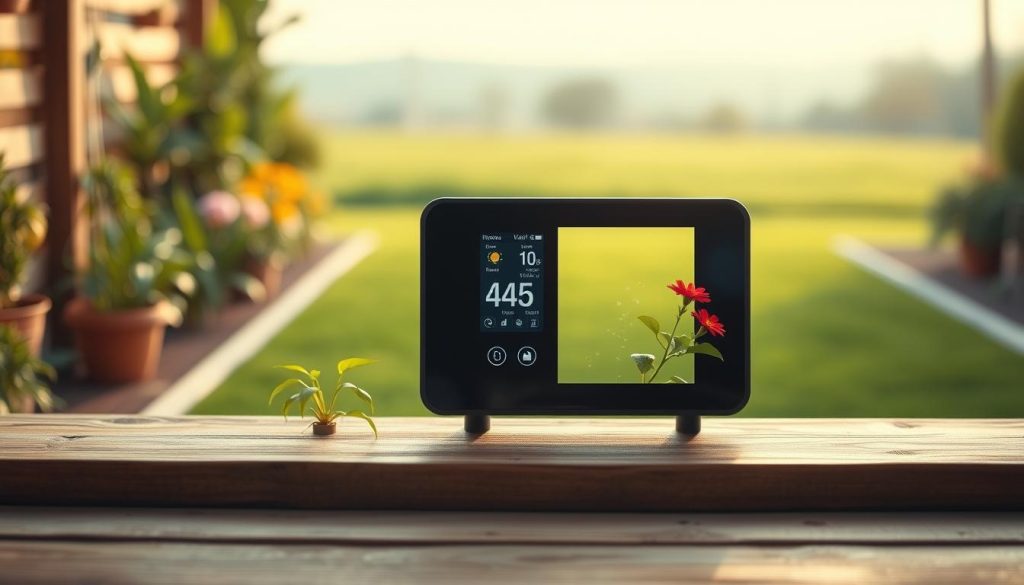
Drip Irrigation Setups for Effortless Watering
Drip irrigation sends water straight to roots. It cuts down on waste and evaporation. The system has flexible tubing with small emitters.
Setting it up is easier than you think. Basic kits start at $30. You can add more zones as you grow.
A drip system can save 2-3 hours a week. It uses up to 65% less water than sprinklers. Plants grow better with consistent moisture.
Soaker Hoses and Sprinkler Timers That Save Hours Weekly
Soaker hoses with timers are great for beginners. Soaker hoses release water along their length. They deliver moisture to the soil.
Mechanical timers are simple to use. They don’t need WiFi or programming. They save 2-4 hours a week during growing season.
The cost is under $50. It’s a good choice for anyone wanting to automate watering easily.
| Watering System | Initial Cost | Installation Difficulty | Weekly Time Savings | Water Efficiency |
|---|---|---|---|---|
| Smart Controllers | $100-250 | Moderate | 3-5 hours | Very High |
| Drip Irrigation | $30-150 | Easy-Moderate | 2-3 hours | Excellent |
| Soaker Hoses | $20-40 | Very Easy | 2-4 hours | Good |
| Sprinkler Timers | $15-50 | Very Easy | 2-3 hours | Moderate |
Choosing any system saves a lot of time. Gardeners say they save 50-100 hours a year. This lets them enjoy their garden more.
Powered tools that cut your workload in half
Modern powered tools have changed home gardening a lot. They can cut your workload by half. This means you can finish yard work in just an hour, not all day.
Choosing the right tools is key. They should fit your property needs and save you time.
Electric vs. Gas-Powered Options: Which Saves More Time?
Electric and gas-powered tools have different benefits. Gas tools are stronger, great for big yards. But, they need more care, like refueling and maintenance.
Electric tools are easier to use. They might not be as strong, but they save time. They need little to no upkeep.
Battery Technology Advancements for Cordless Convenience
Lithium-ion has made cordless gardening tools better. They work as well as gas tools but without the hassle. They’re perfect for yards under an acre.
Battery systems are a big time-saver. They use one battery for all tools. This cuts costs and storage needs.
Time-Saving Attachments and Accessories
Attachments are important but often overlooked. They make tools like string trimmers do more. This means you need fewer tools.
Smart accessories make tasks quicker. For example, a pole saw attachment makes tree pruning easier. You don’t need to climb ladders.
Investing in the right tools changes your weekends. You can enjoy your garden instead of just working on it. The right tools make maintenance easy, not hard.
Lawn maintenance revolutionized: Beyond the traditional mower
Modern lawn care has moved beyond the old push mower. Homeowners now have new solutions that save a lot of time. Mowing used to take up a lot of time, but now there are ways to make it faster.
Today’s mowing technology can change your weekend. It lets you do more things or just relax. This is a big change for many people.
Robotic Lawn Mowers: A Real-World Assessment
Robotic lawn mowers are now a practical tool. They cut your grass on their own, at the right height. They even go back to charge when they need to.
These mowers work best in:
- Yards that are flat and have few obstacles
- Areas with clear boundaries, marked by guide wires
- Lawns up to half an acre, though some can handle more
They cost between $800 and $3,500. But many people say they save time and money in just one season. They don’t work well in very complex or hilly areas.
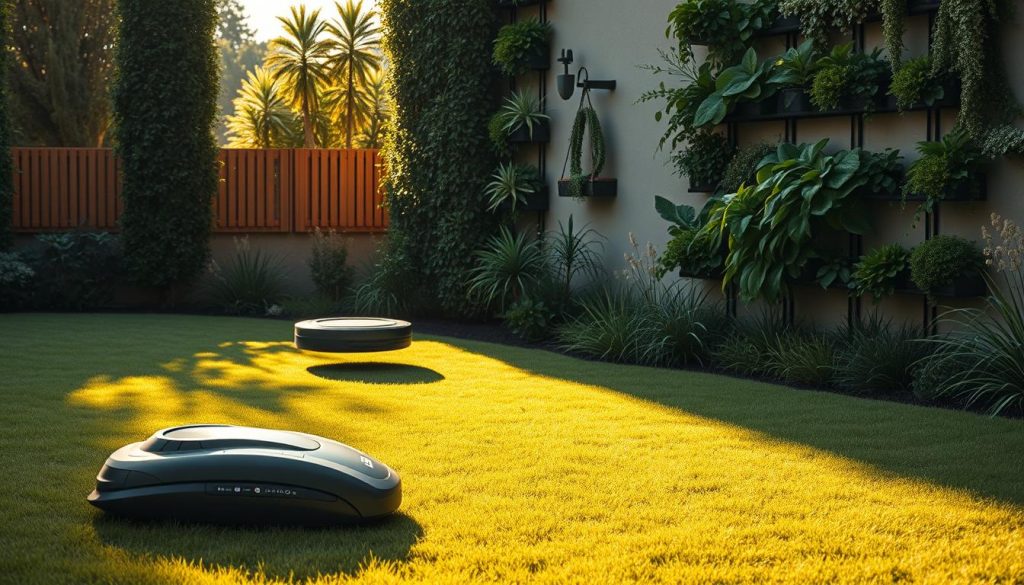
Zero-Turn Mowers for Larger Properties
Zero-turn mowers are great for big lawns. They can cut your mowing time in half. They can turn quickly, making it easier to cut around things.
They’re best for:
- Lawns from half an acre to 3+ acres
- Areas with lots of trees, beds, or other features
- Land that’s mostly flat but can have some slopes
Mulching Mowers That Eliminate Grass Collection
Mulching mowers save time by not needing to collect grass. They cut grass into small pieces that help your lawn. This makes your lawn healthier.
They also save time because you don’t have to stop to empty bags. They help your lawn by adding nutrients. This means you need less fertilizer.
Many people save 30-45 minutes per mow. It’s easy to learn how to use them. They save time every season, making them a good investment.
Soil preparation and planting accelerators
Gardening can be time-consuming, but new gadgets make it easier. These tools help you work less and enjoy gardening more. They make your garden tasks faster and less tiring.
Electric tillers and cultivators that speed up bed preparation
Electric tillers have changed gardening. They are lighter and more powerful than old models. Now, anyone can prepare their garden bed easily.
Choose a tiller based on your garden size. Small beds need a light tiller. Larger areas need a tiller that can cover more ground.
Battery-powered tillers are great for home gardens. They’re quiet, clean, and easy to use. Many say they save a lot of time.
Bulb planters and seed spreaders for efficient planting
Special tools make planting faster. Here are some time-saving tools:
- Bulb augers for quick bulb planting
- Precision seed spreaders for even seed distribution
- Stand-up dibbers for easy planting holes
- Multi-seeders for planting rows quickly
These tools save time and improve planting success. They help plants grow better by ensuring proper spacing and depth.
Soil testing kits for targeted amendments
Soil testing kits are a big time-saver. They help you know exactly what your soil needs. This way, you avoid wasting time and money on unnecessary products.
Digital soil analyzers quickly check pH, moisture, and nutrients. This lets you fix specific problems, saving time and improving plant health.
With these gadgets, gardening becomes faster and more enjoyable. You still get to enjoy working with the soil, but without the long hours.
Ergonomic gardening tools that prevent fatigue and save time
The right tools can make gardening easier and longer. They help avoid the tiredness that makes you stop often. This way, you can do more without feeling tired.
Proper Tool Design for Reduced Strain
Ergonomic tools are made for your body. Handles with a 15-degree bend keep your wrist right. Padded grips stop blisters and make gardening more comfortable.
Tools with balanced weight don’t strain your shoulders and back. Modern pruners and shears are easier to use. They make cutting branches 30% simpler, so you can work longer without getting tired.
Extendable and Adjustable Tools for Different Heights
Tools that fit everyone are hard to find. Telescoping handles on rakes and hoes help you stay upright. They’re great for families with people of different heights.
Look for tools that adjust easily, even with gloves on. The best ones save you time and effort.
Lightweight Materials That Allow Longer Working Sessions
Old metal tools can be heavy. New tools use fiberglass, carbon fiber, and aluminum. They’re up to 50% lighter but just as strong.
Composite handles are warm in cold weather. They’re better than metal in spring or fall. This small change can add hours to your gardening time.
Pruning and trimming tools for faster maintenance
Upgrading to specialized pruning and trimming equipment makes garden upkeep much quicker. Shaping, thinning, and containing plants can take a lot of time. But, modern tools can cut down this time significantly and improve your results.
Extended-reach Pruners for Tall Plants
Extended-reach pruners make it safe and easy to reach high branches without ladders. You can stay on the ground while cutting branches up to 14 feet high.
Manual pole pruners offer precise cuts with adjustable handles. For thicker branches, powered tools with small chainsaw attachments are a big help. They make quick work of large limbs that would need many ladder trips.
Using these tools saves a lot of time. What might take 30 minutes with a ladder can be done in 5-10 minutes. Plus, you won’t get tired from climbing up and down.
Electric Hedge Trimmers for Precise Shaping
Modern electric hedge trimmers have changed how we maintain hedges and shrubs. They’ve made big improvements over older models:
Battery-powered trimmers now match gas models in runtime but without the noise, fumes, or hassle. They’re designed to be easier on your arms, letting you work longer without getting tired. Many also have features that prevent stops and starts, a common problem with older trimmers.
For American homeowners, choosing the right size trimmer is key. Smaller blades are good for detailed work on small shrubs. Larger blades are better for bigger hedges.
Pruning Systems that Reduce Cleanup Time
Cleanup often takes longer than pruning itself. But, new tools are making this easier. Catch-and-hold pruners let you move cut stems to your bag without bending down.
Bypass pruners with sap grooves prevent sticky buildup, saving you from constant cleaning. Some high-end models have rotating handles to reduce wrist strain, letting you work faster and longer.
| Pruning Tool Type | Best Application | Time Savings | Maintenance Required |
|---|---|---|---|
| Extended-Reach Manual Pruner | Branches up to 1″ diameter | 70% vs. ladder use | Annual blade sharpening |
| Powered Pole Saw | Branches 1-4″ diameter | 80% vs. ladder use | Chain sharpening, oil checks |
| Cordless Hedge Trimmer | Formal hedges, shrubs | 75% vs. manual shears | Blade cleaning, battery charging |
| Catch-and-Hold Pruners | Deadheading, light pruning | 50% reduction in cleanup time | Spring mechanism cleaning |
Even the best tools work better with the right technique. Prune at the right time for each plant, make clean cuts, and keep blades sharp. These steps save time and help plants grow healthier, needing less pruning later.
Weed management solutions that minimize manual labor
Now, you can win the battle against weeds in your garden with new solutions that cut down on manual work. Weed control often takes up too much time, leading to frustration and neglect. But, modern tools have made this task easier.
Long-Handled Weed Removers That Save Your Back
It’s no longer a dream to weed without bending or kneeling. Today’s long-handled weed extractors let you target and remove weeds easily. Tools like the Fiskars Uproot Weed Remover use strong claws to grip weeds at the root.
Different soils need different tools for best results:
- For clay-heavy soils, use weeders with narrow, serrated blades
- In sandy soils, choose wider claw designs to prevent weeds from slipping
- For deep-rooted weeds, select tools with extra-long prongs
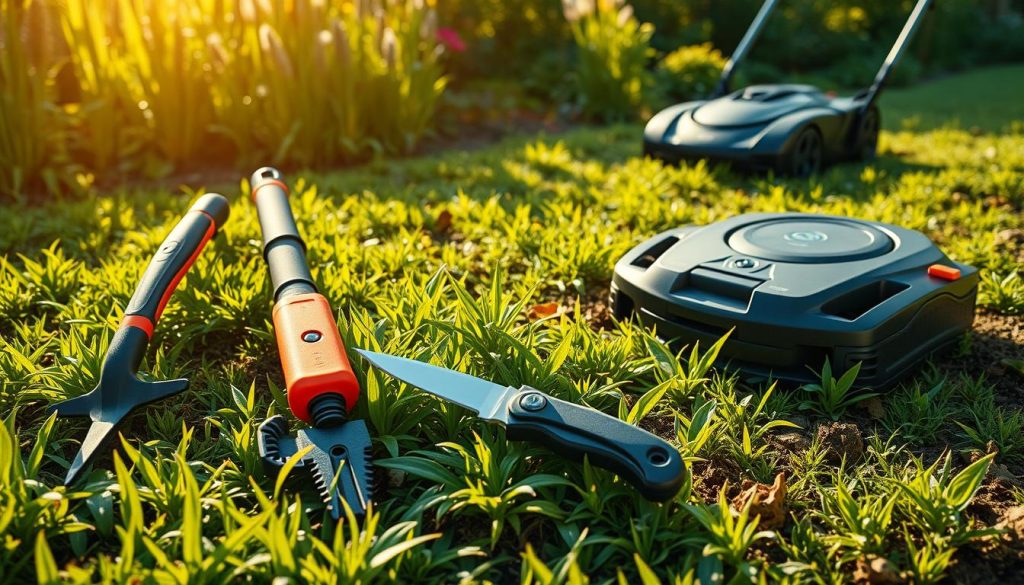
Weed Barrier Fabrics and Mulch Applicators
Prevention is the best strategy against weeds. Today’s professional-grade landscape fabrics actually work. Look for woven polypropylene fabrics that let water through but block light.
Smart devices like mulch spreaders make covering areas quick and even. Wheeled mulch spreaders can cover large areas fast, saving hours of manual work.
Flame Weeders and Other Chemical-Free Control Methods
For those who prefer not to use chemicals, there are good alternatives. Propane-powered flame weeders use heat to kill weeds in hours. This method is precise and effective.
Other options include:
- Infrared weeders that use intense heat without flames
- Hot water systems that cook weeds in place
- Steam weeders that kill both visible growth and seeds
While no single method gets rid of weeds forever, using these tools together helps a lot. By adding these solutions to your routine, you’ll enjoy your garden more and spend less time fighting weeds.
Seasonal time-saving tools for year-round efficiency
Smart gardeners know each season has its own needs. Investing in the right tools for each season can change your gardening experience. The right tool for each season’s challenges can save you time and keep your yard looking great.
Spring tools for quick garden startup
Spring is the start of gardening season, and a quick start is key. Power dethatchers can revitalize your lawn in minutes, saving hours of manual raking. These tools remove dead grass and debris, helping new growth thrive.
Bulb augers that attach to drills make planting spring bulbs easy. They create perfect planting spots in seconds. For gardeners growing vegetables, soil blockers make seedling production faster by creating uniform blocks, eliminating the need for plastic containers.
Summer maintenance time-savers
In the peak growing season, watering and pruning daily can be a challenge. Precision watering devices with timers and moisture sensors ensure plants get the right amount of water. Quick-connect hose systems save time by making connections easy, even on hot summer days.
Specialized pruners with rotating heads make trimming easier, saving effort. These tools keep your garden looking great, freeing up your summer for fun.
Fall cleanup accelerators
As leaves fall, traditional rakes can’t keep up with modern tools. Vacuum-mulchers collect and shred leaves quickly, turning a big job into a short task. The mulch is ready to use in your garden beds.
Tarp-corner collection systems with handles make leaf cleanup easy. Compost accelerators break down garden waste up to 80% faster, turning it into soil for next season.
Winter preparation tools
Protecting your garden during the off-season is important. Plant cover applicators shield sensitive plants from frost. Improved drainage solutions prevent damage from too much moisture. Tool cleaning systems make end-of-season care easier.
Collapsible storage solutions keep tools organized during off-seasons. This makes it easy to start the next gardening cycle without delay. These tools help your garden stay ready for each season, ensuring year-round efficiency.
Making the right investments: How to build your time-saving garden arsenal
Building a good set of gardening tools takes time. Start by figuring out what bothers you most, like watering or weeding. Investing in quality tools might seem expensive at first. But they will last for years and save you time.
When shopping, look for tools that feel solid and have comfortable grips. Also, check if they come with a good warranty. This shows the maker’s confidence in their product. For tools that are easy on your body, try them out before buying. Your back will thank you later.
Plan to buy tools over three years. In the first year, get the basics. The second year, add powered tools. And in the third year, get specialized tools for specific jobs. This way, you spend money slowly but get more efficient over time.
Explore other ways to get tools, like tool libraries or sharing with neighbors. For tools you only use a few times a year, renting might be cheaper than buying.
Good storage keeps your tools in order and easy to find. Wall-mounted systems save space in your garage. They also keep your tools organized and within reach.
The real goal is to enjoy gardening more, not just to save time. With the right tools, your garden can become a place of creativity and peace. It should be a place where you can relax and enjoy the outdoors.

